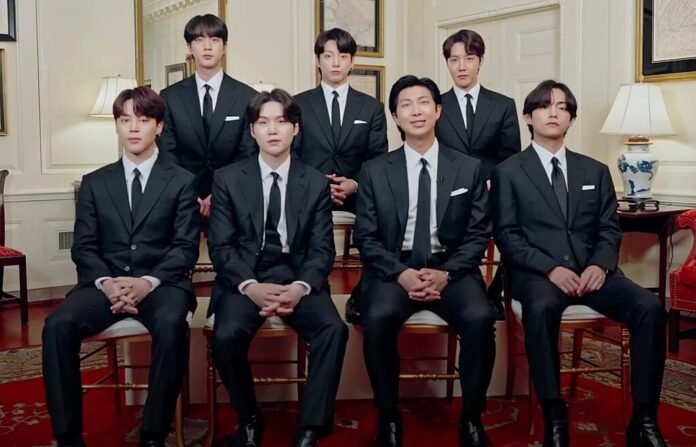BTS ends military hiatus as fans celebrate and the K-pop world braces for a new chapter in turmoil.
BTS, the world’s most successful K-pop group, are officially back – but they return to an industry that’s both evolved and unravelled in their absence.
After a two-and-a-half-year hiatus due to South Korea’s mandatory military service, all seven members of BTS have now completed their enlistment. Suga, the final member still serving, is due to be discharged on Saturday, triggering waves of celebration across the globe.
Their long-awaited return marks a defining moment for fans and the music industry. “I missed them so much,” said Stephanie Prado, a Brazilian ARMY member who moved to Seoul for the group and turned up for the annual “BTS Festa” celebration last Friday. “Of course I want albums and concerts – everything.”
Thousands of fans gathered in Goyang hours before gthe ates opened. Among the crowd, emotions ran high. At a “voice zone” booth playing recorded messages from the group, fans cried and clutched BTS lightsticks, known as ARMY bombs. “I was crying at every location,” said Vuyo Matiwane, a South African fan visiting the band’s favourite haunts. “The wait felt like forever.”
Embed from Getty ImagesBTS strategically staggered their military enlistment so that the full group would be absent for no more than six months. J-Hope, the first to return last October, has already completed a solo world tour, while other members pursued solo music and projects that helped sustain global interest. But despite their solo success, the absence of the full group left a gaping void in K-pop.
“Without BTS, a core pillar was missing,” said Kim Young-dae, music critic and author of BTS: The Review. “Some say K-pop has lost momentum. BTS could change that perception overnight.”
Yet the K-pop landscape has changed dramatically. Blackpink, the other powerhouse group of BTS’s generation, hasn’t released a full album since 2022, opting for solo endeavours. Newer groups like IVE and NewJeans have taken centre stage, shaping a more experimental and fragmented version of K-pop.
For younger fans, BTS now symbolise a previous era. “Most people my age prefer fourth-generation idols,” a 13-year-old IVE fan told the BBC. “BTS feels like an older generation.”
Worse, K-pop itself is wobbling. Album sales have declined sharply since their 2023 peak, and controversies have plagued the industry. A bitter dispute between NewJeans and their agency made headlines, while fan harassment and corporate mistreatment of idols sparked wider scrutiny.
“K-pop went through difficult times while BTS were away,” said culture critic Park Hee Ah. “With fewer albums, scandals, and declining sales, the industry’s deeper problems were exposed.”
Despite the turbulent backdrop, BTS’s return is being treated as a cultural reset. “Their reunion will help refocus attention on Korean music,” Park added, calling it a boost to Korean soft power and morale in a struggling scene.
While there are no immediate plans for all seven to appear together, RM, the group’s leader, has promised a new album and a return to the stage. However, with J-Hope’s domestic concerts and Jin’s international tour still ahead, a full comeback may not happen until early next year. Suga, meanwhile, is expected to keep a low profile following a drink-driving scooter incident last year.
Still, for fans like Stephanie Prado, the reunion alone is monumental. “It’ll feel like nothing ever changed,” she said. “The kings are back.”
